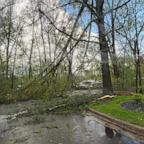Gasoline's peak this summer forecast at $2.30 a gallon
— -- No need to worry about $4 gasoline this summer. Or probably even next year.
Prices for regular gasoline are expected to average $2.23 a gallon during the summer driving season, according to the Energy Information Administration (EIA), the Energy Department's statistical arm.
That's just 18 cents higher than current pump prices and $1.60 below year-ago levels, according to AAA and the EIA. The monthly average should peak at $2.30 late this summer, the EIA says.
Gas prices could be pushed slightly higher by a modest rise in global crude oil prices and increased demand from U.S. motorists, says EIA senior economist Tancred Lidderdale. Bargain prices are enticing Americans to drive more, but any increase likely will be tempered by the weak economy, he says.
A tepid economic recovery is expected to nudge up gas prices next year, but not much. Per-gallon prices should average $2.42 in 2010, the EIA says.
Gas is tracking oil. After peaking at $147 a barrel in July, crude prices sank as low as $33 in December before rallying in March to as high as $54. Crude dipped 64 cents on Tuesday to $49.41 a barrel.
Behind the spring surge: OPEC production cuts and U.S. economic policies aimed at lowering interest rates and stimulating investment, the EIA suggests. Its forecasts call for average oil prices of $53 this year and $63 in 2010, assuming the economy bounces back. The fairly stable estimate came even as the EIA cut its forecast for world oil demand in 2009 by 180,000 barrels per day to 84 million.
Some analysts say summer pump prices could be even lower. Gas prices typically rally at least 20% from their winter lows during the driving season as oil refiners run near full capacity. But gasoline already has jumped about 45 cents, or 27%, from its year-end bottom, says Tom Kloza, chief oil analyst for the Oil Price Information Service.
The economy is so weak and oil refiners have so much surplus capacity that a big demand surge or supply crunch is unlikely, he says. "We've probably seen at least seven innings of the rally," Kloza says.




